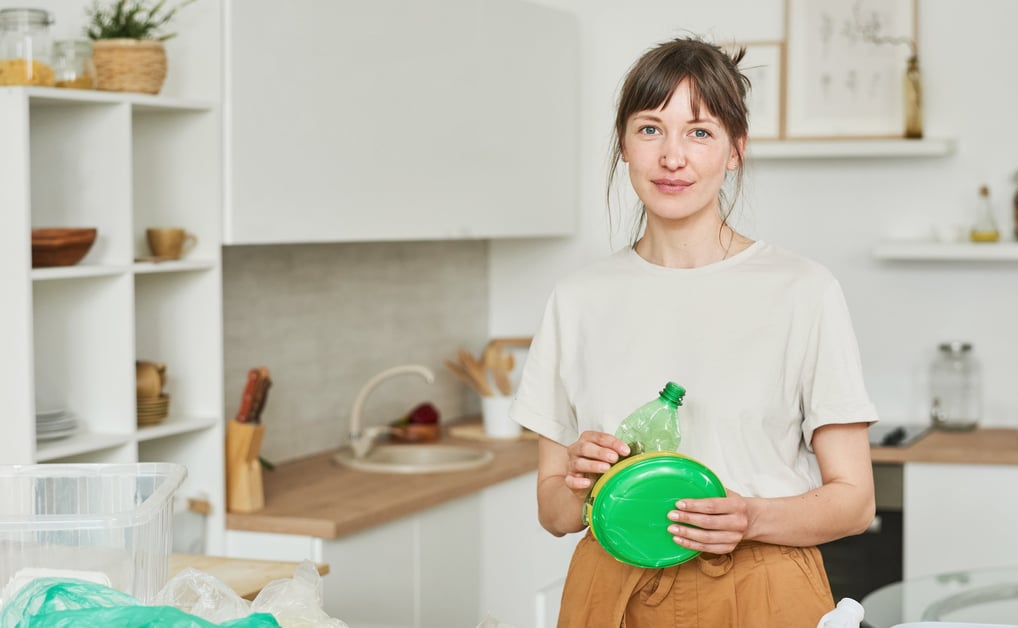6 Easy Recycling Tips: Let’s Make Recycling Easy (and Maybe Fun?)
Discover helpful recycling tips and easy methods to recycle effectively. Contribute towards a cleaner environment with our straightforward guide on how to recycle without hassle.
RECYCLING


Recycling. The word alone can spark confusion. What’s recyclable? Is this actually helping the planet, or am I just sorting my trash for nothing? Let’s cut through the chaos. I promise, recycling doesn’t have to be overwhelming—or boring.
Grab your favorite drink (mine’s coffee, always coffee) and let’s dive into simple, ADHD-friendly ways to recycle smarter and live greener. Plus, I’ll throw in a joke or two—because who said saving the planet had to be so serious?
Why Recycling Matters
Recycling is like giving trash a second chance. Instead of tossing it into a landfill, where it will sit for centuries, we transform waste into something useful.. By doing so, we reduce the need for raw materials and keep tons of waste out of landfills, where it would otherwise release harmful greenhouse gases like methane.
Extracting and processing raw materials takes a heavy toll on the environment. It scars landscapes, drains water resources, and contributes to pollution. Recycling helps ease this burden. When we recycle paper, metals, and other materials, we lower the demand for virgin resources. More trees remain standing, capturing carbon dioxide and supporting ecosystems. Fewer precious metals need to be mined, preserving natural habitats. And water? It stays where it belongs—in rivers and aquifers, not depleted to make single-use items.
Our planet is finite. There’s only so much we can take from it before we risk running out of the resources that sustain us. Recycling is one simple way to safeguard our environment, conserve resources, and build a future that thrives, not just survives. Let’s make it count.
The perks:
Less landfill waste (yay, less methane).
Fewer trees chopped down. Trees are our MVPs in fighting climate change.
Energy savings. Recycling aluminum, for example, saves 95% of the energy it would take to make new cans.
Our planet is like your favorite comfy sweater—finite and worth protecting. Let’s keep it in good shape.
But here’s the kicker: not all recycling systems are perfect. Contamination (like tossing greasy pizza boxes into the paper bin) can derail the process. That’s why knowing the rules in your area and sorting properly are key to maximizing impact.
Recycling at Home: Small Changes, Big Impact
Our journey towards easy and effective recycling begins at home. Incorporating a few simple habits can have a significant impact on the environment. Let's explore some tips for recycling at home:
Kitchen Hacks
Know your recyclables: Glass bottles, aluminum cans, and paper products are the usual suspects. But plastic rules differ everywhere, so check your local guidelines.
Tame food waste: Meal plan, make a shopping list, and store food properly. (Bonus: You’ll save money, too!)
Compost your scraps: Leftover veggies? Eggshells? Toss ‘em in a compost bin. Your garden (or houseplants) will love you.
Bathroom Smarts
Rinse out shampoo bottles and recycle them. (Yes, they count!)
Switch to bamboo toothbrushes or refillable toiletries. It’s like giving your bathroom a sustainable makeover.
Pro Tip: Set up a cute recycling station in your home. Label bins for paper, plastic, and glass. (I used stickers. Who doesn’t love stickers?)
Bonus Challenge: Try a zero-waste week. Keep track of everything you throw away and brainstorm alternatives for the future.
Recycling at School: Teach ‘Em Young
Schools are prime real estate for recycling and reducing waste. Encourage your school to start a recycling program. Explain the importance of recycling to children. Encourage bringing reusable items to school. Here’s how to get the kiddos involved:
Reuse Supplies: Before buying new, check if last year’s notebooks and binders can still do the job.
Go Green at Lunch: Pack snacks in reusable containers. (Pro tip: A mismatched set of Tupperware builds character.)
Composting 101: Pitch a composting program to the school. Bonus points if it’s paired with a student-tended garden.
Imagine a school where kids grow their own veggies. Healthy lunch? Check. Lower carbon footprint? Double check.
Work It: Recycling at the Office
Ah, the workplace—a hotspot for waste (looking at you, single-use coffee pods). Collaborate with co-workers to create a sustainable workplace. Office buildings can have a significant impact in reducing waste.
The average office worker generates roughly 2 pounds of trash per day. That's about 600 pounds of waste per year. If your office has 200 people, your office averages 120,000 pounds of waste a year. And those in the textile industry can double or triple those numbers.
Easy Wins:
Switch to paperless workflows. (Digital files don’t get coffee stains, just saying.)
Bring your own mug for coffee or tea. A quirky design earns extra points.
Recycle old office supplies. Out with the used-up pens; in with the eco-friendly replacements.
Pro Tip: Start a recycling program if your office doesn’t have one. Yes, you might become “that person,” but saving the planet is worth the side-eye.
Advanced Tip: Coordinate with management to host sustainability workshops or “green challenges” to engage coworkers.
Community Recycling: Power in Numbers
Want to make an even bigger impact? Get your neighbors involved. Recycling doesn't stop at home or work; it extends to the entire community. By working together, we can create a greener and more sustainable environment. Here are some tips for recycling in the community:
Ideas:
Host a Recycling Drive: Collect old electronics, batteries, or clothes. Donate them to proper facilities or local charities.
Set Up Drop-Off Points: Partner with schools or community centers to create convenient recycling spots.
Compost Together: Community composting = healthier gardens and less waste.
Fun Fact: Did you know that recycling one aluminum can saves enough energy to power a TV for three hours? Bring that gem to your next neighborhood meeting.
Inspire Action: Form a local “Green Team” to brainstorm and execute sustainability projects like clean-ups or tree-planting events.
Travel Smarter (and Greener)
Just because you’re on the go doesn’t mean recycling takes a backseat. We can still make a positive impact. Here are some ideas for recycling while traveling.
Pack a reusable water bottle and utensils. That’s right—plastic forks are officially canceled.
Use refillable travel-sized containers for toiletries.
Dispose of waste properly. (No, your candy wrapper doesn’t belong in the bushes.)
If you’re driving, check with your local repair shop to recycle old car batteries or oil. Or better yet, bike instead of driving. Your legs—and the planet—will thank you.
Road Trip Hack: Keep a small recycling bag in the car for bottles, cans, or other recyclable items until you find proper bins.
Holiday Recycling: Deck the Halls, Sustainably
The holidays are a magical time…and a wasteful one. Instead of buying plastic and glitter decorations, try making your own from natural materials such as pinecones and fallen branches. LED lights are an energy-efficient alternative to traditional holiday lights. And be sure to recycle or donate unwanted gifts after the holiday is over.
Here’s a few more ideas to keep the cheer without the guilt.
Eco-Friendly Gifts: Give experiences (like concert tickets) or homemade goodies. Fewer boxes, more joy.
Sustainable Wrapping: Use fabric, newspapers, or old maps. Bonus: They look super artsy.
Reusable Party Supplies: Skip the paper plates. Bring out the real dishes, even if they don’t match. (It’s called charm.)
Holiday Challenge: Organize a post-holiday recycling roundup for wrapping paper and cardboard boxes. Bonus points for turning it into a festive neighborhood event.
Let’s Do This Together
Recycling doesn’t have to be perfect. Start small, stay curious, and share what you learn. For more tips and tricks, check out my book Living Lightly: Everyday Practices for a Greener World. It’s packed with simple ideas to make sustainable living feel doable (and maybe even fun).
Have questions? Need inspiration? Reach out! Let’s exchange thoughts and continue the dialogue. Together, we’ve got this.
